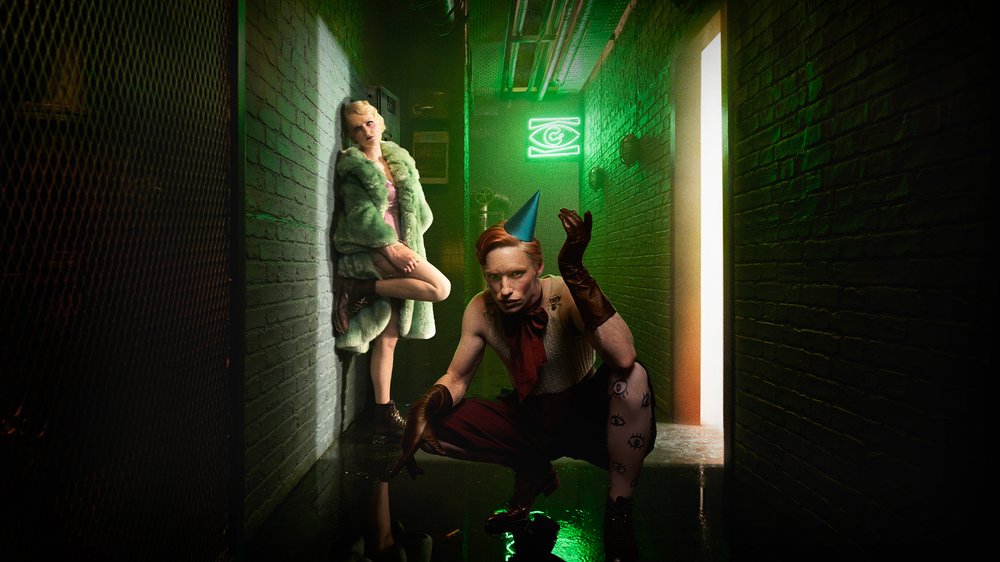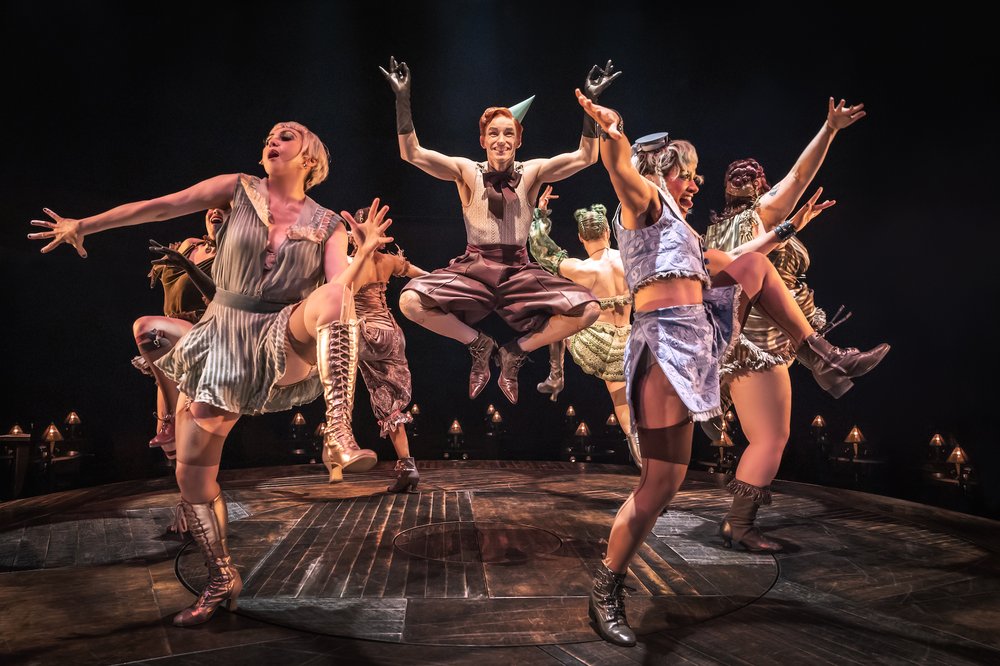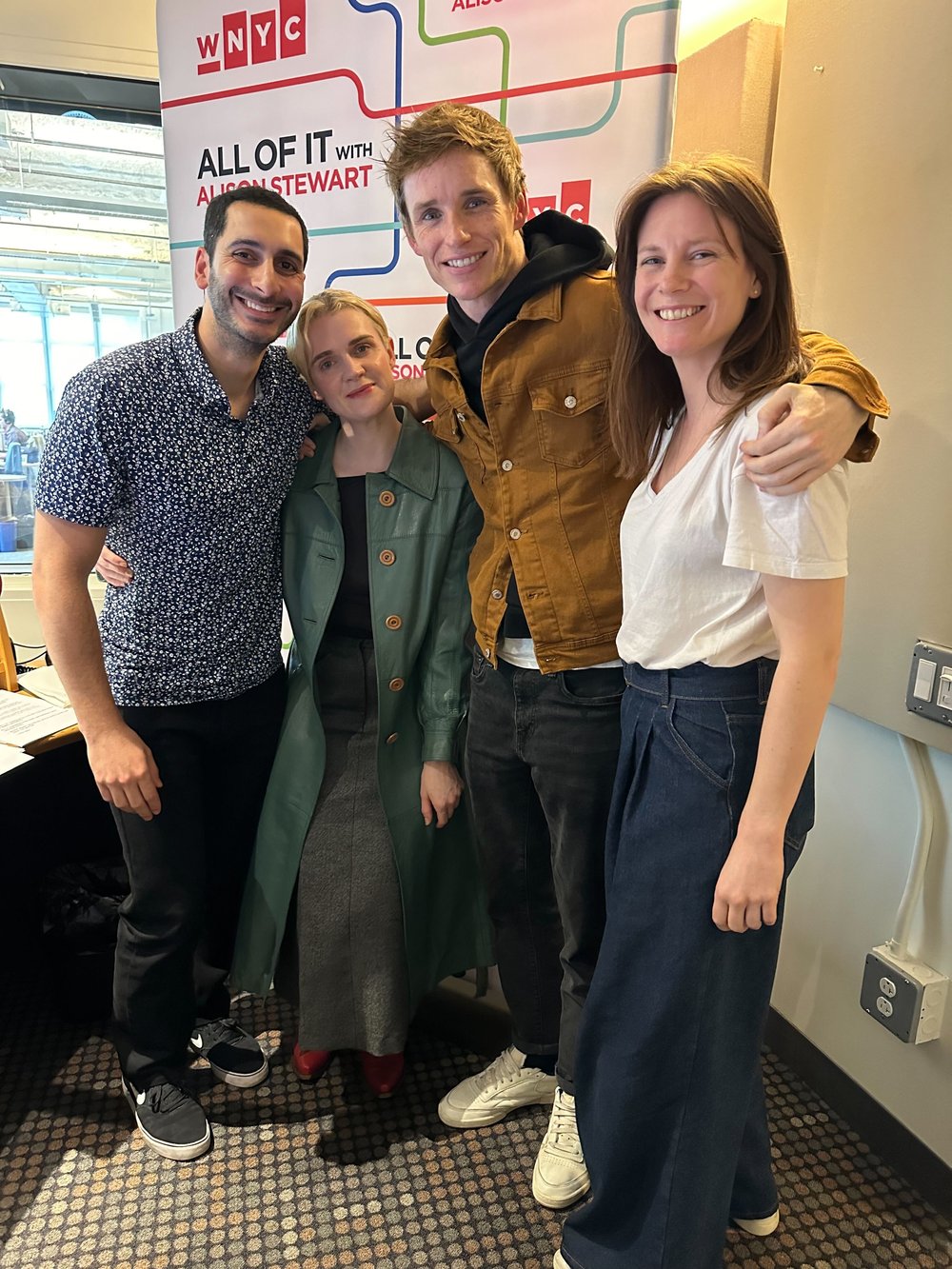Eddie Redmayne on the staying power of Broadway’s ‘Cabaret’
May 19, 2024, 7:01 a.m.
Eddie Redmayne stars in the musical revival, which was nominated for nine Tony awards, including Best Lead Actor in a Musical.

In the revival of "Cabaret," Broadway's August Wilson Theatre has been completely transformed into a Weimar Germany-era cabaret club – with the audience surrounding a small, circular stage.
After entering through an alley, you emerge in a space full of dancers, musicians, drinks and debauchery – and that's all before the musical even begins.
“There was a real desire for the audience to not feel they're coming to the theater,” said director Rebecca Frecknall.
Eddie Redmayne, who was nominated for a Tony award for his performance, plays the role of the Emcee, in which he contorts his body and voice to become a strange creature of hedonism.

“Of all characters that I've ever played, I find him the most enigmatic,” said Redmayne. “That's what's so thrilling.”
The Emcee guides us through the story of Sally Bowles, played by Tony nominee Gayle Rankin. Bowles, a British cabaret singer, thinks her life might be on the upswing after meeting an American writer named Cliff. But with Nazism on the rise, the time for carefree revelry is soon ending, whether Sally wants to admit it or not.
Longtime fans and newcomers to "Cabaret" are likely to find something to delight and surprise them in this new version of the show. It’s been nominated for nine Tony awards, including Best Musical Revival.
Kousha Navidar spoke to Redmayne, Rankin and Frecknall about the play, their creative process, clowning and more on a recent episode of WNYC's "All of It." An edited version of their conversation is below.
Eddie, your first exposure to "Cabaret" was when you first tackled the role of the Emcee when you were a kid. Is that right?
Eddie Redmayne: That is, as strange as it sounds. I think I was about 14 or 15 and we did it at school and I didn't know the show. I watched the film and was completely blown away by it. Ever since, I've been a massive "Cabaret" fan. I obviously saw Joel Grey's performance in the movie and went and saw Alan Cumming's version with Emma Stone, which Gayle was also in here a decade ago on Broadway.

There's something about the character of the Emcee that he doesn't exist in Isherwood's book that "Cabaret" is based on. He was a creation by Harold Prince, the director and Joel Grey. There's this abstract quality to him that is so riveting for actors, I think because he's impossible to pin down really.
While I was watching your performance, I was wondering how you considered the Emcee – as either a person or as a symbol or as a metaphor or something else?
Redmayne: Well, it was in discussion with Rebecca and Tom Scutt, our designer. One of the ideas we liked was that he's almost conjured the evening. The set has a beautiful simplicity to it, almost of a music box or a toy box. He brings these characters in and it's almost like he's the puppeteer.
Across the evening, he shape shifts. Every time he comes on stage, he looks different, whether it's a clown, a skeletal figure. The idea that he goes from puppeteer to conductor as the fascism creeps into the piece – that was something that we were looking for, but that it manifests itself in shifts, in voice and physicality. We played into the abstraction of him.
Rebecca, how early on in the process did you know you wanted this to be an immersive theater experience, that you really wanted to transform the place into the Kit Kat Club?
Rebecca Frecknall: I think when Eddie and I first talked about doing it maybe four or five years ago. [Laughter.] A long time ago, there was a real desire for the audience to not feel they're coming to the theater.
We were really keen to create something that people who are maybe not traditional theatergoers – or feel theater is not for them or feel intimidated by that – could come and experience the piece in a slightly different way.
We were first of all talking about found spaces or real club spaces or what we could do. Then actually, this was the one production where the pandemic actually worked in our favor because The Playhouse Theater in London ended up standing empty for a couple of years over that time, and so The Playhouse became our site that we could respond to and we could change.
We were incredibly lucky that the people at the August Wilson Theatre and Jordan Roth were excited to have us reimagine it there for that space because "Cabaret" is so much about the complicity of the audience.
Is that part of the reason why you made that choice to have the audience in the round, all enveloping the actors?
Frecknall: Yes. In the original Broadway production, the set had a mirror in the back wall, which you see again in the film. It's showing the audience themselves and showing us mob complicity and mob mentality and what that means.
There's a song that the iconic Bebe Neuwirth sings in the show called “What Would You Do?”, and it's a direct question to the audience. It's nonjudgmental, it's an open question, but it hopefully provokes some thinking.
Eddie, what does that add for you of having that audience in the round and it being surrounded on all sides?
Redmayne: It's amazing. The interesting thing for the Emcee is the other character in the scene with him is the audience, and that shifts and changes every night. The audiences that have come here in New York have been so passionate.
What's extraordinary about the evening is you get people dressed in black tie, sitting next to people in fetish gear, next to people in jeans and a T-shirt. For me, interacting with people from different walks of life who are finding different things funny, who are finding different things moving, it's live theater in its most essential form. Of course, that's why actors, we love doing it.
Eddie, I was struck by how physical your performance is. You're really contorting your body. You used the word “puppeteer,” and it's interesting because it looked like you were a marionette at some points. How did you arrive at that physicality for the performance?
Redmayne: It was a dialogue really with Rebecca and Julia, our choreographer. I'm not a great dancer, but–
Gayle Rankin: You are a great dancer.
Frecknall: Not true.
[Laughter.]
Redmayne: Frecks comes from a movement background as well and so we just started very early, didn't we? We had four months of just workshops, and Julia, our choreographer, brought the physicality out of me.
There's an amazing dancer called Mary Wigman, who's worth looking up on YouTube. She did a dance called The Witch Dance, which I found very thrilling, and compelling, and terrifying in equal measure.
Actually, even here in this city, the Neue Galerie has all those amazing Egon Schiele drawings. He depicts hands and some of those bodies. It felt very much of that moment. There was a bit of that and there was a bit of clowning. There's this school in Paris called Lecoq, which is a physical theater school.
I went and did a course there before Frecks and I started working on the theater of the absurd, and it was lots of mask work and all these things. It was lovely to put all of that in the cauldron, I suppose, mix all that around, and then under the guidance of Rebecca and Julia, find a way through him.
Gayle, your Sally has a kind of manic energy to her. What do you think is the source of all of that energy? Do you think it's covering something for Sally?
Rankin: I think it's centuries or decades of some kind of angst. With Sally – there's so much iconography and so many amazing performers have played her, and there's a legend around this character. I think it's why people are so drawn to her. Like the Emcee, Sally carries with her a lot of mystery. I think, especially as a woman, that's a really interesting thing to start to open a door into a character.
I actually don't believe that Sally intends to be mysterious or intends to cover. What I find beautiful and challenging about her is that I think she is intending to tell the truth at all times. I think there's something about the world that is quite difficult for her, and I think it's heightened. I think she's a creative soul and a deeply feminine soul, and in some ways an asexual soul trying to move through this world and we're watching that as an audience, and many people have many, many, many thoughts and feelings and opinions about what that is.
While I was watching it, I was thinking how now is, of course, a particularly poignant moment to be staging a play that deals with antisemitism. Eddie, you did this show in London on the West End a few years ago. I was wondering, have you noticed a difference in audience reception at this particular moment in time?
Redmayne: I think the audience reception shifts nightly. It's a very odd thing being an actor because you get to see how groups of people respond and what the ripple through can be.
What I find extraordinary about [composer] Kander, [lyricist] Ebb and [writer] Masteroff's piece is it's so razor sharp and specific to the period it was written about, but it also then, of course, sung to the moment it was written in, in the '60s – 20 years after the end of the war.
When it was then redone in the '90s, in the Sam Mendes production, there was a war going on in Eastern Europe, and it felt very pertinent then. And it feels extraordinarily relevant now.
I think that it's a testament to the piece that it has that specificity of the period, but it can also be read as rippling across generations, and the sadness that we perhaps haven't learned from our mistakes. I think John Kander puts it beautifully that he hopes that it will stop being relevant at some point.
Why are Broadway tickets so expensive right now? It’s not just inflation. Why is Broadway's 'Six' so popular with teens and tweens? We asked them.